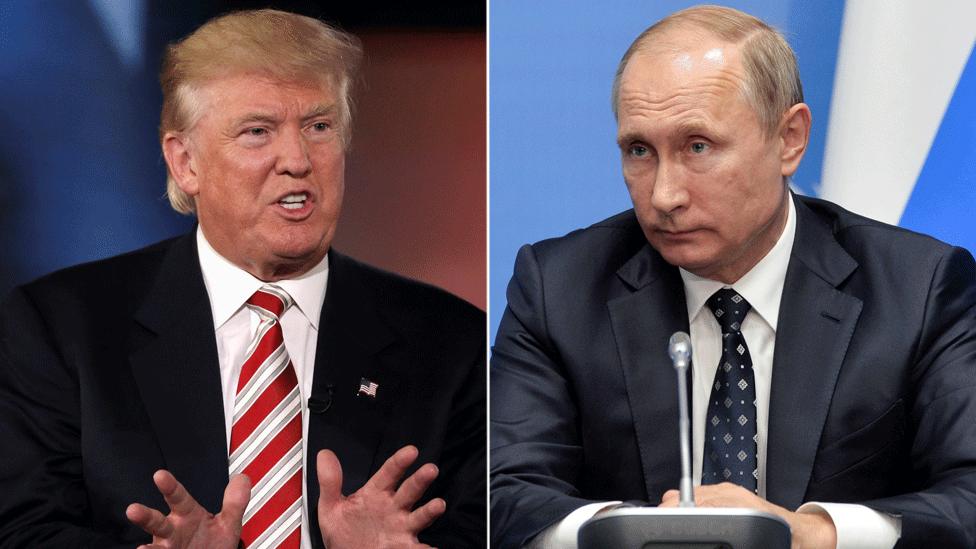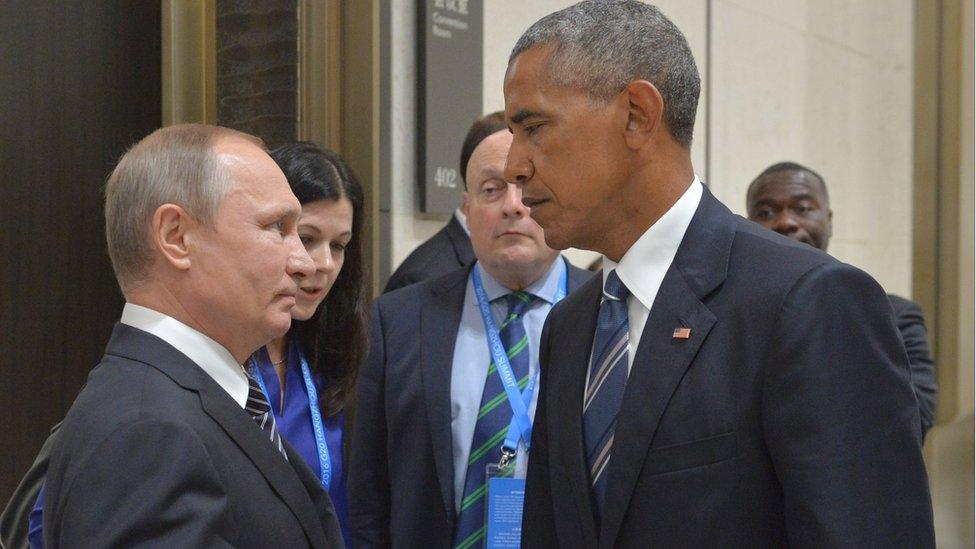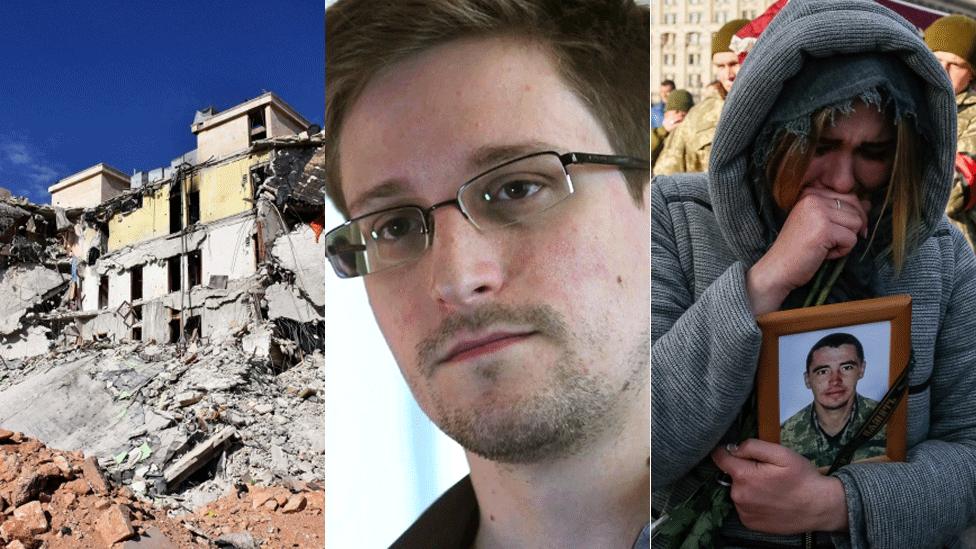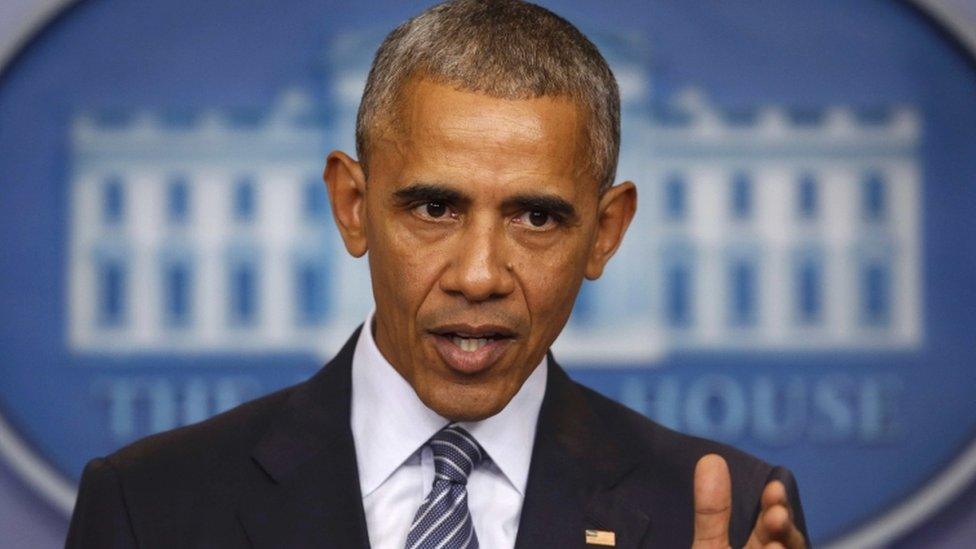Trump and Putin 'will try to mend ties', Kremlin says
- Published

Donald Trump praised Vladimir Putin during the election campaign
US President-elect Donald Trump and Russian President Vladimir Putin will try to "normalise US-Russia ties", the Kremlin has said, following a phone conversation between the two.
Mr Putin wished Mr Trump "success in implementing the election programme".
Mr Trump, who had praised Mr Putin in the election campaign, said he wanted an "enduring relationship with Russia".
Meanwhile, President Barack Obama said Mr Trump had told him he remained "committed to a strong Nato".
'Pragmatic'
The Kremlin revealed Mr Trump and Mr Putin had discussed Syria and agreed that current Russian-US relations were "extremely unsatisfactory".
Meet President Trump's possible cabinet
Who is Trump's chief strategist?
Obama urges Trump to reach out
Trump's promises: Before and after
They also talked about the fact that 2017 marked 210 years since the establishment of diplomatic relations between the countries "which in itself should stimulate a return to pragmatic, mutually beneficial co-operation".
Mr Putin and Mr Trump had agreed to stay in touch by phone and arrange to meet in person at a later date, the Kremlin added.

Relations between Mr Putin and President Barack Obama have been frosty
The Kremlin did not make it clear who had initiated the phone call.
But Mr Trump's office said the Kremlin had called and that issues such as mutual threats and challenges, and strategic economic affairs, were discussed.
It said: "President-elect Trump noted to President Putin that he is very much looking forward to having a strong and enduring relationship with Russia and the people of Russia."
Mr Trump's election has seen a change in tone from Russia towards the US, with state TV channels quickly switching from claims of electoral fraud to hailing the triumph of the "man of the people".

Syria, Edward Snowden and Ukraine have been three key problems in US-Russia ties
The BBC's Steve Rosenberg in Moscow says that Russia views America's new president as a pragmatist - a brash businessman that Russians can do business with.
Relations between the two countries have soured in recent years, despite President Obama starting his eight years in office by calling for a "reset" with one of the US' long-term rivals.
While Russia and the US have managed to work together on issues like North Korea and Iran, they have openly clashed on Syria.
Mr Obama has also condemned Russia's intervention on the side of pro-Russian rebels in eastern Ukraine, while Russia's decision to grant whistleblower Edward Snowden asylum infuriated Washington.
Mr Trump's rival for the presidency was no better liked in Moscow. Hillary Clinton was sharply critical of Russia's 2011 parliamentary elections, leading President Putin to accuse her of fomenting the mass protests against him that followed.
'Beacon of hope'
Mr Obama met Mr Trump last week and, at a press conference on Monday, said the new president had "expressed a great interest in maintaining our core strategic relationships", including "strong and robust Nato" partnerships.

Mr Obama said he "absolutely" still had concerns about a Trump presidency
During the election campaign, Mr Trump had openly criticised those Nato members who he believed were not doing enough work within the organisation and had relied too heavily on the US.
Mr Obama was speaking ahead of a trip that takes in Germany, Greece and Peru.
He said he hoped Mr Trump would "look at the facts" of the nuclear deal agreed with Iran, an accord the president-elect has to this point resolutely opposed.
Mr Obama said he "absolutely" still had concerns about a Trump presidency and that there would be "certain elements of [Mr Trump's] temperament that will not serve him well unless he recognises them".
But he said there was "enormous continuity" in the US presidency and he believed the US would remain a "pillar of strength and a beacon of hope to peoples around the globe".
Mr Trump will succeed Mr Obama in the White House on 20 January.

Trump presidency: Your questions answered
Do you have more questions about a Donald Trump presidency?